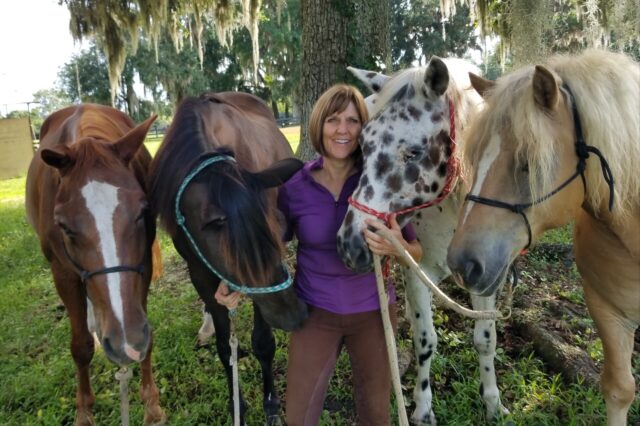Back on the saddle

In the face of adversity, Lisa Alexander got back on the horse — literally.
Lisa has made horses an integral part of her life since her 30s. Once a competitor in upper-level dressage, a highly skilled form of horseback riding, Lisa lives on a property in northwest Ocala where she cares for 12 equines. But Lisa’s passion for riding and nurturing horses came to a sudden halt three years ago when she was diagnosed with breast cancer.
At first, Lisa said she was intimidated by the diagnosis and at the thought of losing the body she once knew and relied on to ride horses.
“It’s your whole body, your muscles, your center of gravity,” Lisa said.
Lisa selected a full mastectomy of her right breast because of the nature of her cancer. Fortunately, because of her surgery, Lisa did not require additional treatment, such as chemotherapy or radiation.
After a six-month healing process, Lisa was ready to look at her options for breast reconstruction.
“I thought, ‘What are my choices to reclaim my body, one I can live with and live my life with?’” Lisa said.
When searching for a hospital to have her reconstruction done, Lisa, who is originally from a metropolitan area with an academic medical center, had a bias for teaching hospitals.
“We have this amazing resource in North Central Florida where you have people who are so skilled that they teach medicine and the teaching experience itself is multiplied through practice,” Lisa said. “Instead of a doctor (practicing medicine) alone, it’s a doctor with an audience. Being open about that process is of such value. You can’t get that elsewhere.”
Lisa sought out the UF Health Plastic Surgery and Aesthetics Center, where she met Bruce Mast, M.D., chief of plastic and reconstructive surgery at UF Health and the Maurice J. Jurkiewicz Professor of Reconstructive Plastic Surgery at the UF College of Medicine. “It was a very thoughtful process and Dr. Mast was very understanding that I wanted my body back,” Lisa said. “I was very afraid of losing my physical abilities with reconstructive surgery. I wanted to lift a saddle onto my horse.”
Lisa elected to have a breast implant, the least impactful surgical option. “Life went on (after reconstruction), but I realized that the implant was not the best choice,” Lisa said.
At Lisa’s one-year reconstructive appointment, Mast examined her progress and began asking her questions. Mast noticed that the implant had become surrounded by thick scar tissue, which resulted in discomfort and limited Lisa’s movement due to tightness.
Mast offered Lisa a more invasive surgical option, known as a flap procedure that would release the scar tissue and add more tissue to better shape the breast. The procedure involved moving muscle, tissue and skin from a person’s back, while the tissue kept its own blood supply, to release the scar tissue, shape the breast and use a smaller implant. The flap procedures are more complicated because they work with live tissue and blood supply. “It took bravery on my part,” Lisa said. “But I’ve thought about that moment a lot and how it could have played out anywhere else.”
Lisa believes that the value of a teaching hospital and academic medical center is the availability of many techniques and the open mindedness to apply the right treatment to each patient.
After Lisa’s flap reconstructive surgery, the six-week healing process included weekly follow-up visits and phone conversations with the physician assistants, or PAs, at the UF Health Plastic Surgery and Aesthetics Center. Since the flap procedure included incisions on the back and front of Lisa’s body, she was connected to drains that would be checked frequently, in addition to checking for how the muscle was holding the new implant in the correct place.
“The PAs are some of the most skilled women that I have ever met,” Lisa said. “They know what they’re doing, they know his (Dr. Mast’s) work, they know the procedure and they know the healing process.”
During her procedures, Lisa’s husband, Gordy, would bring the equines — donkeys, miniature ponies and horses alike — into their stalls for Lisa to meet and hug without risking injury. Now, Lisa is back to caretaking for them.
“There’s something about how you get accustomed to being in your own body and then something changes profoundly,” Lisa said. “I adjusted but you don’t understand all the compromises that go with that until someone removes it. I want my body to take me places and allow me experiences for as long as I possibly can. This has been a gift. I have a whole new threshold of wholeness now to work from.”
About the author
